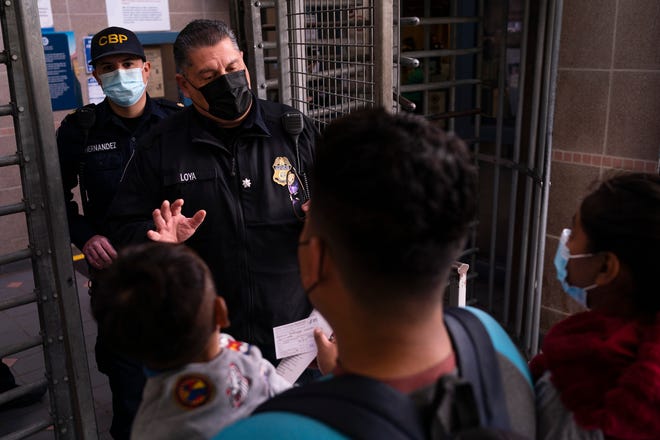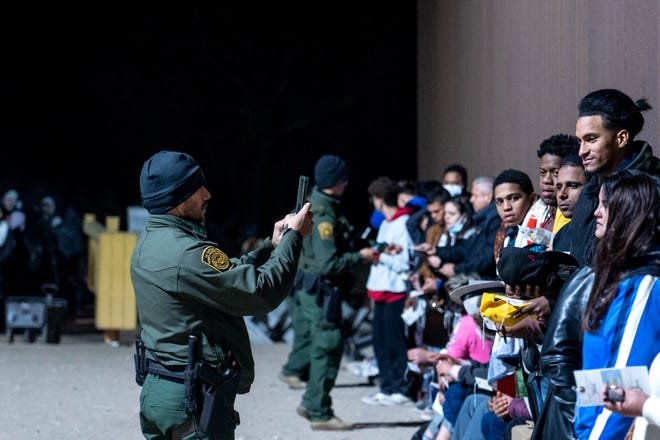Local officials in Arizona welcomed President Joe Biden’s decision to send 1,500 troops to the U.S.-Mexico border on Tuesday, and immigration advocates condemned the move.
Biden’s decision comes days before Title 42, the pandemic-era health rule used to rapidly deport more than 2 million immigrants, expires. Be prepared for more immigrant encounters in the days following the lifting of the lockdown.
The military will perform ground detection, data entry, warehouse support and other administrative tasks so that US Customs and Border Protection agents can focus on field investigations, according to a U.S. Department of Homeland Security official.
State and local officials in border communities welcomed the move, which they said would reduce the burden on border agents and allow agents to focus more on their jobs. 42 is part of an effort to facilitate asylum procedures at the southern border, which is expected to expire.
But immigration advocates in Yuma and Tucson condemned the decision to further militarize the border, calling it a “huge” mistake that will lead to more “death, suffering and destruction.”
Isabel Garcia, co-chair of the Coalición de Derechos Humanos, a Tucson-based immigration advocacy group, said:
“I am outraged that[Biden]is planning to deal with the massive immigration flows we see from parts of the world where people are fleeing truly dire conditions.”

The troops will not conduct law enforcement operations and will be deployed for about 90 days, but can extend their presence if needed, officials said.
Troops will begin arriving on May 10th. The Army and Marine Corps provide troops.
There are 2,500 National Guardsmen at the border. It is not yet known how many troops will be sent to each part of the border.
“People seeking protection in the United States should see humanitarian aid, medical and mental health professionals, social workers and lawyers, not soldiers and law enforcement,” Laura St. John, Florence Immigrant and Refugee Rights the legal director of the project said in a written statement.

In Yuma, Fernando Quiros, head of the AZ-CA Humanitarian Coalition, said bringing the military to the border was not the solution. Quiros and his organization are helping immigrants along the border of Yuma and Mexico with food, water and heat relief.
“Our military is set to do other things, and it saddens me that this administration has decided to take that step. should not be.”
Kiros cited the parents of Vice President Kamala Harris, who immigrated to the United States from India and Jamaica. Harris talked a lot about her immigrant parents during the 2020 presidential election.
“What if[Harris’]parents had met when they were seeking asylum and said the military wouldn’t welcome them?” Quiroz asked. “That’s the reality.”

Local officials characterize the deployment as a ‘step in the right direction’
Local elected officials spoke with Senators Kirsten Cinema (I-Ariz.) and Mark Kelly (D-Ariz.) on the morning of the announcement to discuss plans ahead of the potential deactivation of Title 42. bottom.

“Mobilizing active duty personnel to our southern border will alleviate some of the severe tensions facing Arizona border communities every day,” Cinema, I-Arizona said in a statement. “The administration must do more to enact a realistic and workable plan to secure our borders, keep Arizona people safe, and ensure that immigrants are treated fairly and humanely. I have to.”

Yuma County Superintendent Jonathan Lines said the deployment was a step in the right direction and that the additional support was “great”. He said he hopes to slow the process down for people.
“We support the military and are grateful that they can play a role in supporting the men and women dressed in green and blue here,” Lines said.
U.S. Immigration Plan:Pandemic-era border rules end next month, but new US immigration plan hinges on Mexico
Yuma Mayor Doug Nichols hit back at Lines by hailing the military deployment as a move in the right direction. Nicholls also questioned how effective the military would be at keeping Border Patrol agents focused on their duties.
“It’s basically the realization that there are things that really need to be done at the border that are different,” Nichols said.
“I’m sure to what extent it will help, but I’m not sure.”
Former Arizona Governor Doug Ducey has deployed the National Guard to the border after declaring a state of emergency in April 2021.
In February 2022, former Attorney General Mark Brnovich issued a legal opinion that Ducey would be authorized to use the military against “invasions” of drug cartels and criminal syndicates.
According to Maldonado, CBP and Border Patrol officials have not yet spoken to Nogales Mayor Jorge Maldonado about the military deployment. Maldonado said he was just trying to get the community ready before Title 42 sundown.
“It’s nothing to fear,” Maldonado said of the military deployment.
more:Immigrants do not have the right to an attorney in immigration court.Democrats want to change that
Douglas Mayor Donald Heish said the deployment of the military was a move in the right direction, but argued that there are many aspects that still worry the community regarding the potential end of Title 42.
“If they’re just handling administrative stuff, I hope the Border Patrol will be able to do the work they’re hired to do,” Huish said.

Huish emphasized the need for transportation, temporary shelter, and a holistic plan for how the Biden administration will treat people in an orderly manner.
Huish said the small border community of Douglas has few resources or infrastructure to help migrants passing through the community to feed, house and transport to their final destinations.
“Douglas itself doesn’t have the resources to help them,” said Whisch.
Critics of Mr. Biden’s move have compared it to former President Donald Trump, who deployed active-duty military personnel to assist Border Patrol agents prior to the arrival of a migrant caravan from Central America in 2018.
The military is just an addition to the already existing National Guard.
The Associated Press contributed to this report.
Got news tips or story ideas about the border and its communities? Contact reporters at josecastaneda@arizonarepublic.com or reach out to us on Twitter @joseicastaneda.
















